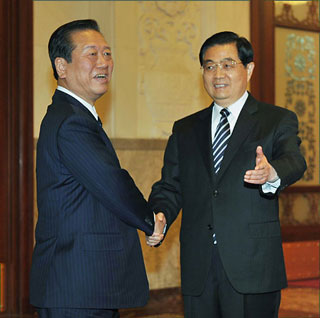TOKYO, Sept. 16 (Xinhua) -- The Fourth Beijing-Tokyo Forum began its plenary meeting Tuesday in Tokyo.
Personages and prominent figures from various circles of the two nations had in-depth exchanges of views on bilateral relations and were of the same opinion that promoting two-way exchanges and mutual trust will be conducive to the advancement of bilateral ties.
At the start of the plenary meeting, Japanese Foreign Minister Masahiko Komura and Chinese Ambassador to Japan Cui Tiankai, on behalf of their respective governments, advocated joint efforts Tuesday to push forward the Japan-China relations and conveyed good wishes for their further advance.
Komura said that the Japanese government attaches great importance to its ties with China and it is his conviction that this general trend will not be reversed.
The two nations have made joint efforts to push forward bilateral ties as well as address regional and international issues in recent years, said Komura, adding that under the guiding principle of the Japan-China strategic and mutually beneficial relations, the two nations have witnessed advances and improvements in their ties.
Cui, for his part, said that national interests of the two countries entail both friendly relations and mutually beneficial cooperation.
And the stable, sound and long-term development of China-Japan relations serves as an important factor in maintaining both nations' prosperity and stability in the volatile international environments.
In his keynote speech at the meeting, Wang Chen, director of the State Council Information Office of China, hailed the China-Japan cooperation as a fine example for countries with different social systems.
He said that there are important bases and favorable environments for the long-term development of bilateral friendly relations.
For China-Japan friendship, geographical proximity is the natural link, political mutual trust serves as an important basis, mutually beneficial cooperation the economic basis and long-term people-to-people exchanges the important bridge, said Wang.
This year marks the 30th anniversary of the launch of China's reform and opening-up, he said, adding that China has made world-acknowledged outstanding achievements in its development in the past 30 years.
Wang said that China's development, characterized by its peace, openness, cooperation and harmony, offers a brighter prospect for the development of both nations.
The current world is undergoing profound changes, he said. And China is willing to work with Japan to actively participate in international cooperation in various areas, jointly promote world peace and achieve common development of the human race.
The two sides need to deepen mutual understanding in a bid to continuously promote the sound development of bilateral ties, said Wang, expressing his belief that with goodwill as well as cooperative attitude aimed at win-win results and sincerity for frank exchanges of views, the friendly relations between the two nations are sure to be continuously cemented.
Representatives from political circles as well as friendship bodies, including Zhao Qizheng, chairman of the foreign affairs committee of the National Committee of the Chinese People's Political Consultative Conference (CPPCC), Chen Haosu, head of the Chinese People's Association of Friendship with Foreign Countries, Li Zhaoxing, chairman of the foreign affairs committee of China's National People's Congress (NPC), Yusuhisa Shiozaki, Japan's former chief cabinet secretary, Koichi Kato, chairman of Japan-China Friendship Association, also participated in the discussion of the general situation of China-Japan relations.
Later in the day, the forum had panel dialogues in terms of their respective subjects on such issues as politics, region, media, economy, security, environment and food.
Having had frank and in-depth exchanges of views on the relevant issues, representatives of both sides were of the same mind on some issues though remained divided on some others.
Most of the participants, however, agreed that the face-to-face exchange of views should be promoted as it helps deepen mutual understanding of the two nations.
The Fourth Beijing-Tokyo Forum opened with a dinner party late Monday. In their speeches at the party, Hiroya Masuda, Japanese Minister of Internal Affairs and Communications, and Wang Chen lauded the role the forum has played in the development of bilateral ties and wished it a success.
Present at the three-day forum are more than 100 personages from various circles of both countries.
The annual forum, co-sponsored by China Daily and the non-profit Japanese organization Genron NPO, is held alternately in Beijing and Tokyo. The first Tokyo-Beijing Forum took place in Beijing in August 2005.
|




 Reply With Quote
Reply With Quote





Bookmarks